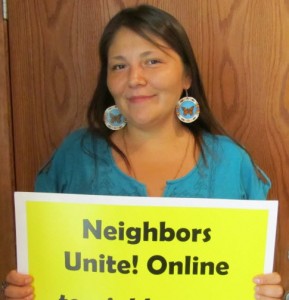We have three big reasons to donate now to E-Democracy for 2016 (more below*):
- Your Neighborhood/Neighbourhood
- Your Community
- Our Democracies – Local democracy on up to worldwide impact

At the end of last year, we had our most successful pledge drive to date. One donation drive a year – hopefully short – is our goal!
Thanks to your help, we doubled of our number of donors. With two surprise $1000 donations at the end, we blew past our bare bones budget goal of $10,000 and raised $12,000 to pay for our online hosting and help desk support all throughout 2015.
From our online community forum members in Massachusetts and Minnesota to new donors from our UK forums and global “e-democracy” supporters, we pulled together to make our volunteer-based forums 100% self-sufficient all year. You – our participants and supporters – made it happen. Thank you.
Now it is time to launch into 2016 with gusto. Donate today.
Today is the beginning of our end of year pledge drive.
- Nov. 12 – Donate via Give to the Max Day – Focus on Minnesota forums – So far we’ve raised $1915 from 58 donors today. Keep it going.
- Dec 1 – #GivingTuesday – Massachusetts and UK forums, global e-democracy supporter focus – You can donate now if you like!
- Until we raise $15,000 Total (that’s 10,000 GBP for our UK neighbors) – Donate now to shorten the drive, set a recurring donation, or contact us about making a matching fund pledge to help us build support from new donors
- Donate by Check Option -Â Mail to: E-Democracy, 3211 E. 44th Street, Minneapolis, MN 55406, USA
| Donate to E-Democracy @GiveMN
Special donation drives for Minneapolis, Saint Paul and Framingham, MA. |
Or Donate in US Dollars Globally – $
Donate from the UK – £ |
This year, we need to raise $15,000/10,000 GBP to support our online hosting costs (successfully delivering ~30,000 emails from posters to readers everyday is expensive – that’s over one million individual community/democracy building connections delivered a year), our vital Help Desk service, and modest software/feature improvements for 2016. This cost is a drop in the bucket compared to the value of volunteers hours unleashed in every neighborhood we serve on up to our volunteer Executive Director role.
In the coming days and weeks, we will update you on our pledge drive progress.
At the bottom of every email is an opt-out form. We understand that not every member of our local forums wants to receive updates about the entire network. And for the 3,500 new members on our forums site getting this special update for the first time, please note the details on our activities this year below. We are a small non-profit with a democracy building mission, not just a technology provider. Thanks.
 We miss you Dan
We miss you Dan
We share these 2015 highlights in memory of Dan Jellinek, E-Democracy’s first Board member from the UK. Dan was taken from his family and all of us by a sudden and unexpected brain hemorrhage last month. In honour of Dan, we recommend you check out his People to the People book.
*E-Democracy’s 2015 Highlights
- 1. Your Neighborhoods/Neighbourhoods
- We love neighborhoods! – Our strongest Neighbors Forums continue to thrive – from lost dogs being reunited to free stuff to vital community issues being discussed the local communities online movement is spreading – particularly on Facebook Groups – all around the world. Our “how to” lessons with Neighbors Online are useful across all platforms. Our volunteer-based, non-profit, inclusive public space and open source for local communities online remains a unique around the world. In addition to serving our communities, we are a lesson-building test bed and passionate about open sharing. What new ideas do you have for communities online? Share them! Let’s get creative.
- Twin Cities Participant Survey Released – Amazing insights were shared with all from a whopping 1300 respondents on our blog. 56% credit their forum for being more satisfied with their local community. 79% more informed about community issues, 45% learned more about how to influence community decisions, 32% learned more about neighbors of different races and ethnicity, 22% do more favors for neighbors than before, 41 attend more community events, 42% visit local businesses or hire neighbors for odd jobs more. Over 750 people have reviewed these results and the University of Pittsburgh continues to generate related research from our activities.
- Finished BeNeighbors.org Report to Knight Foundation – We strongly believe that inclusion is vital including connecting local communities online across race, income, and immigrant/native born is vital. If you would like review our grant report, please contact us. Unfortunately, the venture funded and commercial-based neighbors online connecting efforts with the major resources today are hyper-connecting the most wired and higher income neighborhoods far more than lower income areas. They are not working to intentionally building bridges among diverse communities. We have have many ideas about what is needed to promote more inclusion that is socially essential to counter the exclusive resident-only gated-community approaches so attractive to Silicon Valley investors. Get in touch if you want to help us make those ideas a reality. We will continue to build on our inclusion mission with volunteer capacity in our neighborhoods to show how openness and inclusion works.
- 2. Your Community
- Growth – Our community-wide efforts in Framingham and now Westwood in Massachusetts continue to grow. The Saint Paul Issues Forum was a hopping forum this year and the #stpaul15 Election 2015 directory and experimental Local Candidates Facebook Interest List collecting posts from scores of local candidates promotes social media connecting with candidates and elected officials.
- Our city-wide “online townhall model” – like the Minneapolis Issues Forum – remains an important missing gap for participation in almost all cities. While neighborhoods online is spreading on many platforms, spaces for city-wide civil discussion of happenings in local city councils remains very rare.
- Open Twin Cities with Code for America – E-Democracy is the proud fiscal agent for one of the world’s best local “Brigades.” With 2Â local meetups each month and hackathons, this is a great example of community-wide open government and civic technology innovation.
- 3. Our Democracies – Local Democracy on up to Worldwide Impact (These are volunteer or contract revenue generating activities that further support our forums.)
- Global Convening – E-Democracy’s exciting Open Government and Civic Technology Facebook Group is approaching 5,000 members from 100+ nations. Join in on this global sharing engine. This year we’ve hosted civic tech social gatherings in Washington DC (after our Executive Director met one on one with staff from the White House Office of Science and Technology Policy) and Brussels via the “events” feature on the group. Our Democracies Online Newswire email list remains our most powerful knowledge sharing tool and our directory of over 100 e-democracy related online groups remains popular.
- Taiwan, Philippines, Community of Democracies in El Salvador and more –  E-Democracy’s work and 20 years of e-democracy lessons were shared by our Executive Director Steven Clift as a guest of the U.S. State Department in Taiwan in July. Check out this geekier version of the presentation in video (with Chinese translation). Presentations continued in the Philippines including one to nearly 1,000 students at the City University of Manila. Weeks later, we presented a case study on E-Democracy from our neighbors online work at the 106 nation Community of Democracies conference (a network of national governments promoting democracy). Next up is participation in the World Forum for Democracy hosted by the Council of Europe next week. Steven has been working for the UK-based Knowledge Hub and his 1 Radio News start-up while volunteering for E-Democracy which he co-founded in 1994. These efforts need to be thanked for their flexibility with time spent on E-Democracy.
- Online Deliberation – E-Democracy finished our report to the Kettering Foundation on lessons from our pilot use of their Common Ground for Action platform for online deliberation. E-Democracy provides contract services where possible as grants for inclusive online civic engagement work have dried up with more focus on technological solutions and open data. E-Democracy remains a people first, technology second organization.
- Global Civic Tech Collaboration – Contracted by UK-based mySociety.org, E-Democracy led a special three month project to expand online engagement in the Poplus.org civic tech collaboration effort. Unlike most tech projects that under-invest in human-centered outreach and engagement, Poplus.org made engagement a priority. We increased the number of countries represented on the group from 60 to 80 and added 200 new members. Read the exciting round of introductions.
- YourNextRepresentative – E-Democracy is collaborating with DataMade in Chicago, mySociety in the UK, and Congreso Interactivo of Argentina to deploy YourNextRep for the Minnesota state legislative election early in 2016. This will be the first pilot deployment of the innovative UK YourNextMP project which made candidates for parliament far more accessible online. The crowd-sourced data was so good, Google used it as the semi-official data source of candidate links. Join the Poplus.org online group and/or MN-Politics forum to get involved or contact us.
- Ideas for Open Government and Inclusion – In our meetings with White House staff, the Sunlight Foundation and others, people have expressed an interest in new data from a census survey of 40,000+ Americans on their Internet use which includes a question on e-government service use. We analyzed the previous survey here and see an opportunity for the “open government” community to better understand who is and is not being reached with government online so we can target our scarce resources to do something about it. Join here and contact us for more information. We are seeking funding to lead a research and dissemination effort building on this just released data (which buried e-gov use in “other”). We also included use of this data in a Knight News Challenge proposal about the “democratic data deficit.” That proposal includes some of our latest thinking about filling the gaps with open government/civic tech/e-democracy that need to be filled.
-
Donate to E-Democracy @GiveMN Special donation drives for Minneapolis, Saint Paul and Framingham, MA.
Or Donate in US Dollars Globally – $ Donate from the UK – £


